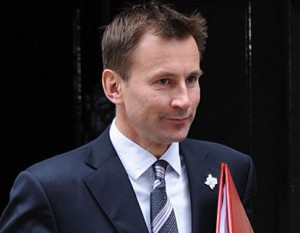Hunt: ‘I followed due process’
April 25, 2012
 UK culture secretary Jeremy Hunt has told MPs he “strictly followed due process” in the way he handled the BSkyB takeover bid by News Corp. He said it was not true that the firm had any “back channel” of influence, when he was in a “quasi-judicial” role.
UK culture secretary Jeremy Hunt has told MPs he “strictly followed due process” in the way he handled the BSkyB takeover bid by News Corp. He said it was not true that the firm had any “back channel” of influence, when he was in a “quasi-judicial” role.
Making a statetement in the House of Commons to fellow MPs, Hunt said: “Transcripts of conversations and texts published yesterday between my special adviser, Adam Smith and a News Corp executive have suggested there is a back channel. This is categorically not the case. However, the volume and tone of those communications were clearly not appropriate in a quasi-judicial process, and today Adam Smith has resigned as my special adviser.”
Smith resigned over contact with News Corp admitting contacts when too far, he says Hunt wasn’t aware of the extent or content of those contacts. The Ministerial Code says ministers are responsible for the behaviour of their special advisors.
Opposition spokesperson on media Harriet Harman said Hunt had been “backing” rather than “judging this bid” and should resign.
Hunt says he was not backing the bid. He had not made his mind up. His views were reported to the cabinet secretary, who decided it was acceptable for him to take charge of it. Because he had expressed some sympathy for the bid before he became responsible for it, he sought the advice of individual regulators. If he was backing the bid, he would not have done that.
Hunt says he took four decisions during the process. Each of those was contrary to what News Corp wanted.
First, he said he was minded to refer it to the Competition Commission. James Murdoch did not want that.
Second, he said he would not accept undertakings in lieu until he received advice about whether they dealt with the plurality concerns. James Murdoch was angry about this.
Third, he extended the consultation process.
Fourth, after the Milly Dowler revelations, he wrote to Ofcom asking if those were relevant.
The idea that he was backing the bid “is laughable”, he contended.
Frederic Michel, head of public affairs at News Corp, and the recipient of the emails revealed in the Leveson Inquiry yesterday, has said his references to “JH” in emails were actually shorthand for Hunt’s special adviser, Adam Smith.
Meanwhile, Hunt has begged the Leveson inquiry to give him a chance to testify ahead of schedule.
The Michel emails appear to show that Hunt’s office in effect told News the bid ‘was in the bag’ as a result of the further ‘undertakings in lieu’, i.e. the promises to float off Sky News as a separate company but at the same time continue to fund it. These assurances came the day before an announcement of the timetable for judging the bid.
Hunt’s self defence in Parliament and by colleagues in TV and radio studios rested, in part, on the fact the deal didn’t go through. However this was because of the breaking of the phone hacking scandal at News International at the same time.
